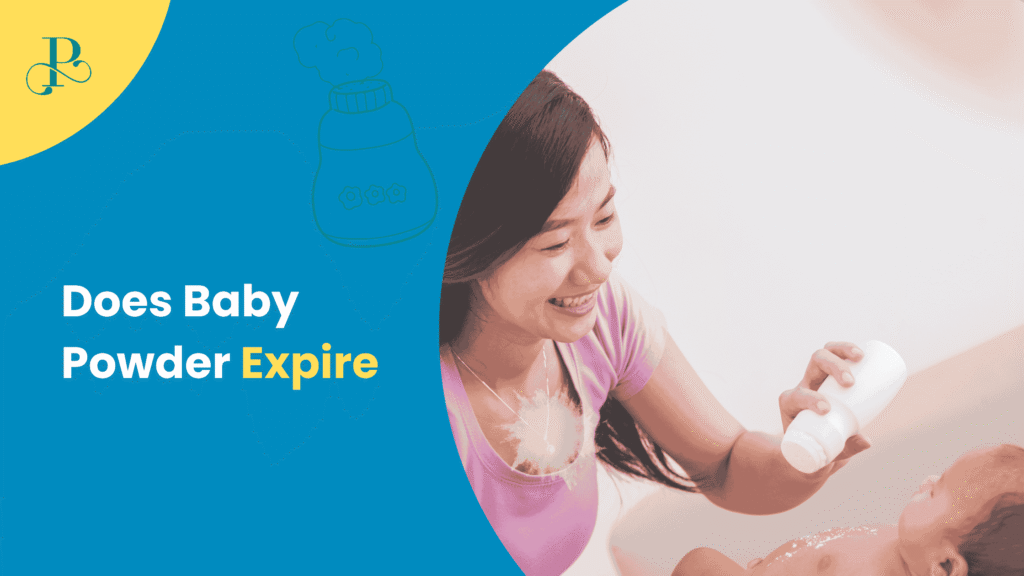
Yes, baby powder does expire, typically lasting between 18 months to 3 years depending on the ingredients. While talc is mineral-based, modern cornstarch powders are organic and can degrade or develop mold over time, especially if exposed to moisture or humidity.
Parents and adults can use baby powder, but they always worry about: Does baby powder expire? In this guide, we’ll explain how long it lasts, the difference between cornstarch and talc, and when it’s time to throw that bottle away.
How long does baby powder expire?
Because baby powder is a “shelf-stable” product, it doesn’t spoil as quickly as food, but it does degrade. The expiration timeline depends largely on the ingredients—specifically whether it is made of cornstarch or talc.
- Cornstarch-Based Powder: Most modern powders are made from cornstarch, a natural carbohydrate. These generally have a shelf life of 18 to 36 months. Once you open the seal, it is best to use it within 12 months.
- Talcum Powder: While less common now due to health concerns, talc is a mineral and does not biologically break down. However, the fragrances and oils mixed into it do. Manufacturers typically recommend discarding talc products 3 years after manufacture.
Does baby powder expire if unopened?
Many parents wonder if a brand-new, sealed bottle found in the back of a closet is still safe to use. Yes, baby powder does expire even if it is unopened.
Even with the seal intact, the ingredients inside can change over time.
- Fragrance breakdown: The pleasant “baby scent” is often the first thing to go, leaving the powder smelling stale or chemical-like.
- Moisture penetration: Plastic bottles are not perfectly impermeable. Over several years, microscopic amounts of humidity can seep in, causing the powder to clump or develop mold spores, especially if stored in a humid environment like a bathroom.
- The 3-Year Rule: As a general rule of thumb, if an unopened bottle is older than 3 years, it is safer to throw it away than to risk using it on delicate skin.
Where is the expiration date on baby powder?
Finding the expiration date can be tricky because not all governments require cosmetic products to have a clear “Use By” date printed on them. Here is where you should look:
- The Bottom of the Bottle: Most major brands (like Johnson & Johnson) print a manufacturing date or an expiration date on the very bottom of the container. It is often stamped in black ink or embossed into the plastic.
- The “PAO” Symbol: Look for a small icon of an open jar with a number inside it (e.g., “12M” or “24M”). This stands for Period After Opening. It tells you that once the seal is broken, the product is good for that many months.
- Lot Numbers: If you only see a code (like “LOT1234”), you can call the manufacturer’s customer service number. They can use that code to tell you exactly when that specific bottle was made.
Is it safe to use and what will happen if you use expired baby powder?
No, it is not safe to use expired baby powder on infants, and it is not recommended for adults. Baby powder can go bad, particularly cornstarch-based varieties which typically expire about 18 months after opening. You should discard the product if you notice any clumping, a change in color, or a musty or sour smell.
You might be tempted to use that old bottle anyway, thinking, “It’s just powder, what’s the worst that can happen?” However, using expired baby powder carries real risks:
- Skin Irritation: As ingredients degrade, the chemical balance of the powder changes. This can cause contact dermatitis, redness, or itching, particularly on a baby’s sensitive skin.
- Fungal and Bacterial Growth: This is the biggest risk with cornstarch powders. Since cornstarch is a food product, it can feed bacteria and mold if it has absorbed any moisture. Applying this to a diaper area (which is warm and damp) can trigger or worsen a severe diaper rash or yeast infection.
- Loss of Effectiveness: Old powder often becomes clumpy and gritty. Instead of gliding smoothly to reduce friction, it can act like fine sandpaper, chafing the skin rather than protecting it.
How to Store Baby Powder Properly?
To get the most life out of your baby powder, storage is key. Surprisingly, the most common place people store it is actually the worst place for it.
- Avoid the Bathroom: The humidity from hot showers can seep into the bottle, causing cornstarch to clump and spoil faster.
- Choose a Cool, Dry Place: A bedroom drawer, a linen closet, or a nursery shelf away from direct sunlight are ideal spots.
- Close the Lid Tightly: Make sure the twist-cap is fully closed after every use to keep moisture out.
Conclusion
To sum it up, baby powder definitely expires, even though it may sit on your shelf for years without looking much different. While talc-based powders may last a bit longer than modern cornstarch varieties, both are susceptible to moisture, bacteria, and chemical breakdown over time.
Using expired powder isn’t just about it being “less effective”—it can pose real risks. Old cornstarch powder can harbor mold that worsens diaper rashes, and degraded fragrances can irritate sensitive skin.
Remember these key takeaways:
- Check the Texture: If it clumps or isn’t silky, it’s gone bad.
- Smell It: A sour or musty scent is a clear sign to discard it.
- Watch the Clock: If you can’t find an expiration date, stick to the 3-year rule. If the bottle is older than three years, replace it.
A new bottle of baby powder is an inexpensive investment compared to the discomfort of a skin infection. Keep your powder fresh, store it in a cool, dry place outside the bathroom, and always prioritize your baby’s skin health over using up an old product.